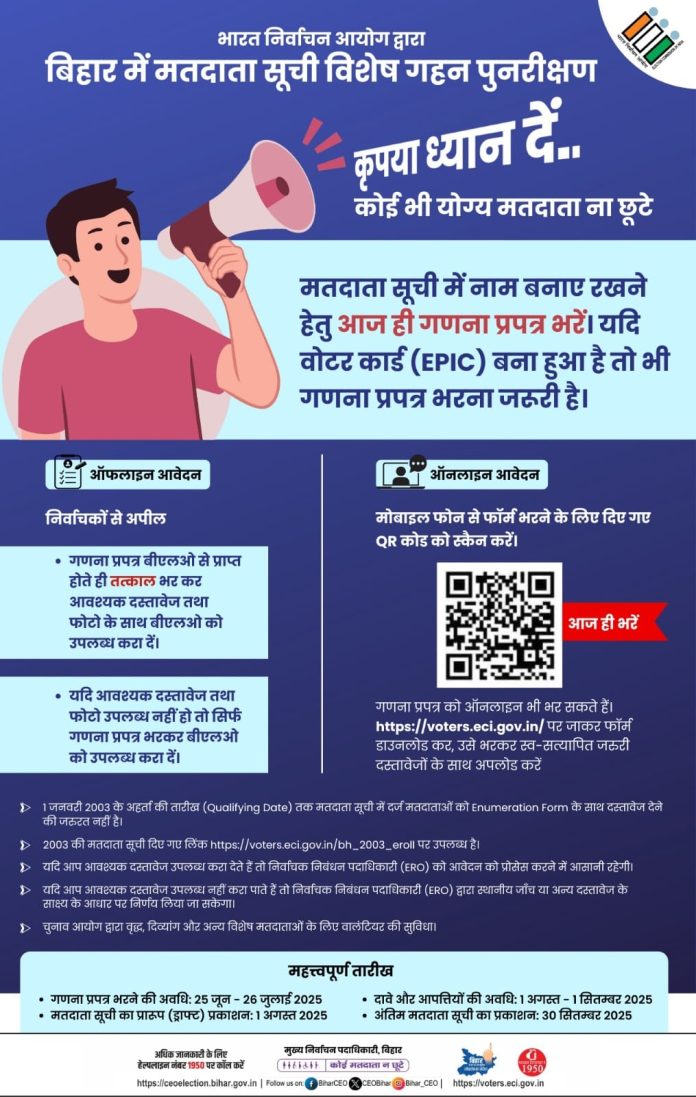— Md. Sami Ahmad
Patna: In a significant shift, the Election Commission of India (ECI), which became ‘document-hungry’ with its stringent voter verification demands, has substantially relaxed its requirements for voter enumeration in Bihar. The ECI’s latest directive, issued quietly amid widespread opposition and logistical challenges, now permits voters to submit enumeration forms without any of the 11 documents it had initially mandated.
This marks a notable departure from the ECI’s earlier rigid stance, which had sparked accusations of voter suppression and political bias. However, lingering procedural ambiguities and discretionary powers granted to local officials suggest that the path to a fully inclusive voter revision process in Bihar remains fraught with challenges.
The controversy began with the ECI’s announcement on June 24 of a Special Intensive Revision (SIR) of Bihar’s voter list, following a final revision completed just four months earlier in February. The SIR required voters to submit one of 11 specified documents — such as birth certificates, matriculation certificates, or other less commonly held records — alongside their enumeration forms. Notably, widely possessed documents like Aadhaar cards, PAN cards, or ration cards were explicitly excluded from the list, raising immediate concerns about accessibility. The process drew sharp criticism from opposition parties, social organizations, and civil society groups, who accused the ECI of orchestrating a covert attempt to implement the NRC through the backdoor.
Critics argued that the SIR disproportionately targeted marginalized communities whose access to formal documentation is often limited, including the Seemanchal region, where the Muslim population is high compared to other regions. The ECI’s notification further fueled suspicions by referencing “illegal foreign immigrants,” a phrase closely associated with the BJP’s political rhetoric.
This led to allegations that the SIR was designed to favor the ruling BJP and its coalition partner, JD(U), by potentially disenfranchising voters from opposition strongholds. Congress leader Rahul Gandhi warned on June 7 of a “Maharashtra match-fixing” in Bihar’s electoral process, accusing the ECI of undermining democratic fairness. Other opposition figures echoed these concerns, highlighting that the document requirements could disproportionately affect the poor, backward castes, Dalits, and women, who often lack access to the specified records due to systemic barriers.
Social organizations and opposition parties mobilized protests across Bihar, with estimates suggesting that nearly three crore voters — approximately 40% of the state’s electorate — would struggle to produce the mandated documents. The opposition’s call for a statewide Chakka Jam (road blockade) protest on July 9 underscored the scale of public discontent. Internally, the ECI faced logistical challenges as well, with reports indicating that many voters listed in the 2003 electoral roll — whom the ECI initially exempted from document requirements along with their children — had since relocated, changed their names, or faced other issues that complicated verification.
In response to the mounting pressure, the ECI began softening its approach. Its first concession exempted voters listed in the 2003 electoral roll and their immediate family members from submitting documents. However, this measure proved insufficient, as many voters had updated their details or moved to different constituencies, rendering the exemption impractical for large swathes of the population.
The ECI’s latest directive, issued on July 7, goes further declaring that while the 11 specified documents can facilitate processing by Electoral Registration Officers (EROs), they are no longer mandatory. Instead, EROs are now authorized to verify voter identities through local inquiries, alternative evidence, or other unspecified means. This shift has been cautiously welcomed by voters and activists, who see it as a pragmatic response to public outcry and a recognition of the practical difficulties faced by Bihar’s diverse and often underprivileged population.
Despite the relaxation, significant concerns remain. The ECI’s decision to grant EROs discretionary power to demand documents introduces a layer of uncertainty. Without clear, standardized guidelines, there is a risk of inconsistent application across Bihar’s 38 districts, potentially leading to arbitrary rejections or delays in voter registration. Critics argue that this discretion could be exploited to target specific communities, particularly in politically sensitive areas like Seemanchal, where the BJP and its allies face strong opposition.
The rollback has also exposed tensions within Bihar’s ruling coalition. While BJP and JD(U) leaders initially defended the SIR as a necessary step to ensure electoral integrity, some JD(U) figures privately expressed concerns that the document requirements could alienate their core voter base, including extremely backward classes and women, who form a significant portion of the party’s support.
Speculation has swirled that JD(U)’s relatively muted response to the controversy may be linked to CM Nitish Kumar’s ongoing health challenges, which have reportedly limited his ability to engage actively in the debate. This has left the party navigating a delicate balance between supporting its coalition partner, BJP, and addressing the concerns of its electorate.
As the ECI continues to dilute its SIR guidelines, the softened stance reflects a pragmatic acknowledgment of both public sentiment and the political realities on the ground. For Bihar’s voters, the relaxation offers a reprieve, allowing many to participate in the electoral process without the burden of producing hard-to-obtain documents. Yet, the persistence of discretionary powers for EROs and the lack of clarity in the verification process suggest that challenges in ensuring a fair, transparent, and inclusive voter revision in Bihar are far from resolved. As the state prepares for upcoming elections, all eyes will be on the ECI to see whether it can address these lingering issues and restore confidence in the electoral process.




